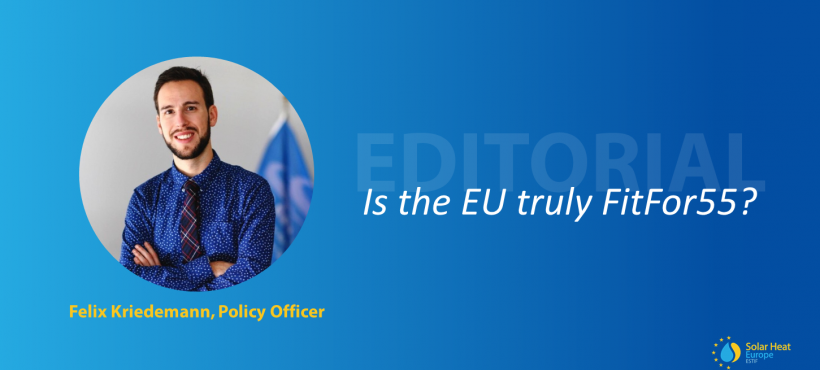The Green Deal was the Von der Leyen Commission’s promise to make Europe the first carbon neutral continent in the world by 2050. To this end, in 2019, the Commission committed itself to safeguard biodiversity, eliminate pollution, transition to a circular economy, while boosting the EU’s industrial competitiveness. A year later, during the 2020 State of the European Union (SOTEU) address, Commission President Von der Leyen proposed a reduction of -55% of greenhouse gas emissions by 2030 (compared to 1990) to achieve the Green Deal’s aims. Finally, on the 14th of July this year, the Commission unveiled a sweeping set of reforms known as the “FitFor55 Package” to avert disaster.
These reforms most notably included revisions of the EU’s energy mix for the next decade, with a special focus on the Renewable Energy Directive (RED), the Energy Efficiency Directive (EED), and the upcoming Energy Performance of Building Directive (EPBD). Since 75% of energy still comes from fossil fuels, and half of the energy we consume is for heating and cooling, focusing on energy reform and addressing heat decarbonisation directly is an excellent choice. But will the reforms as proposed now really make us “fit” for -55?
The RED establishes an overall target of 40% of renewable energy, a 49% share of renewables in the building sector by 2030, and an industrial transition target of 1.1% a year. In addition, it encourages a planned replacement of old heating systems running on fossil fuels, a decentralised energy production, and increases the funding for renewable heating and cooling. The EED adds to the mix by improving transparency on energy savings for consumers, foreseeing economy-wide energy savings of 45% (by 2030), and promoting financial help to low-income households.
These are all great proposals, alas despite the staff’s hard work during these months (which must be commended), our institutions’ political ambition is still far from being sufficient to stay below the +1.5oC pathway. With citizens across every continent perishing due to climate conditions such as wildfires, heat waves, or floods, we can no longer afford to have a precautious energy transition, Europe must be bold.
The overall renewable target in RED must be increased to 50% by 2030, industry should transition at a rate of at least 5% per year, while planned replacements in our homes must be made mandatory, instead of recommended. But most importantly, we must accept that fossil fuels are no longer an option, we thus have a responsibility to start massive deployment of all renewable energy technologies currently available and treat them on a level-playing field. As a start, there must be equal funding of all renewable energies, if PV and solar thermal energy both accelerate the energy transition in our communities, it stands to reason that they should receive equal funding and regulatory attention. Diversifying our energy mix will ensure lower energy costs, more consumer empowerment, and more innovative growth in these technologies, and even if there is overwhelming data showing it, we do not see this balance in reality. Funding all renewables equally is the only winning card for real and timely decarbonisation, and it must be central to the future of our energy. Moreover, this funding must be paralleled with financial support for citizens who cannot afford the energy transition, or the rising energy prices could have dire economic and political consequences.
In the spirit of a fair transition for both renewables and consumers, Solar Heat Europe echoes Vice-President Timmerman’s statement that “the transition will either be just, or there just won’t be a transition”. The EU and its Member States have been bold before, we must once again master our courage, this time not for peace alone, but to ensure a liveable planet for all. The European solar thermal sector is ready to support and deliver on the bold objectives needed to keep our planet safe for current and future generations, and it commits once again to contribute to a decarbonised society with renewable and affordable heat for all.


Leave a Reply